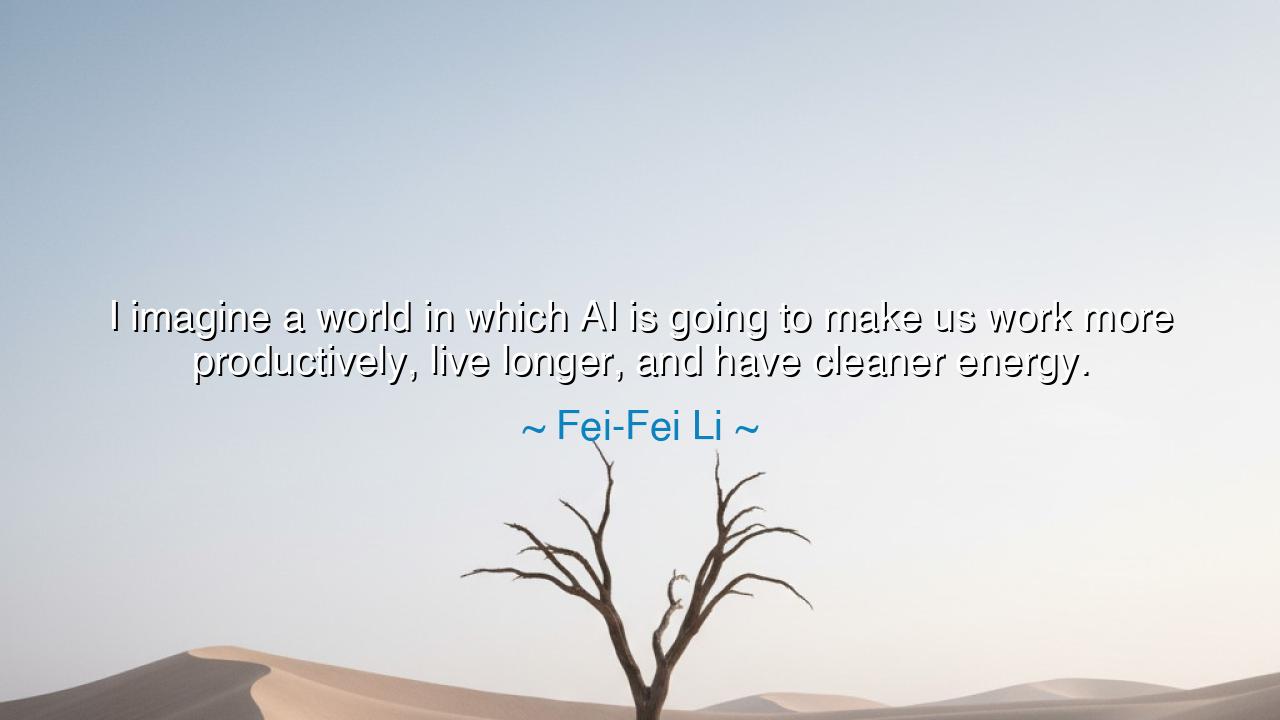
I imagine a world in which AI is going to make us work more
I imagine a world in which AI is going to make us work more productively, live longer, and have cleaner energy.






The words of Fei-Fei Li, “I imagine a world in which AI is going to make us work more productively, live longer, and have cleaner energy,” are a vision cast forward into the horizon of possibility. She speaks as a seer of her age, gazing upon the powers of knowledge and machine not as terrors to be feared, but as tools to uplift the human spirit. Her hope is not for conquest, but for harmony — a union of wisdom and invention that serves life itself.
The gift of AI is imagined not as a tyrant, but as a servant: aiding us to work with greater fruitfulness, releasing time and strength for higher callings. Where once toil consumed the body and burdened the mind, now labor may be transformed into creativity, discovery, and care. This is the first promise — that human hands may be freed from drudgery, and the spirit elevated to new tasks.
To live longer is the second blessing. For when knowledge joins with healing, the frailty of flesh is softened, and years once lost may be restored. Yet this promise is not merely of lengthened days, but of deepened quality — lives enriched by health, resilience, and renewed opportunity. The ancients longed for the elixir of life; in our time, science offers a path toward its echo.
And the third promise is cleaner energy, the lifeblood of the earth made pure. No longer must the world be choked by smoke or scarred by waste, for intelligence may guide us to sources of power that are both abundant and kind. Thus, Fei-Fei Li’s vision stands as prophecy: that through AI, humanity may learn to live not in conflict with creation, but in harmony with it.
To future generations, her words are both dream and command. Imagine boldly, she teaches, for imagination is the seed of destiny. If AI is guided by wisdom, compassion, and justice, it shall not enslave us, but help us live more fully, work more nobly, and guard the world for those yet to come.






TADang Thu An
Fei-Fei Li’s optimism about AI shaping a better future is thought-provoking, especially when we consider how AI could improve our work and health. However, I also wonder about the societal consequences. Will AI change how we view work, leisure, and even human relationships? How do we ensure that AI’s progress doesn’t come at the cost of human connection and the jobs that people depend on?
HPhp pham
Fei-Fei Li’s vision of AI improving productivity, health, and sustainability sounds promising, but it also makes me wonder about the environmental impact of AI itself. While AI may help create cleaner energy, what about the energy demands required to power AI systems? Are we considering the full lifecycle of AI technology, and how sustainable is its growth in terms of environmental impact?
NKNguyen Khoa
Fei-Fei Li’s view on AI is optimistic, envisioning a future where technology plays a major role in solving global issues. But it raises an important question—how do we ensure that AI benefits everyone, not just a few? Can we create a society where AI-driven productivity leads to overall well-being, or will it only serve those who can afford it? How do we make sure the advancements are accessible to all?
PLPhuong Linh
The idea of AI making us work more productively, live longer, and have cleaner energy sounds incredible. However, how realistic is this vision in the short term? What obstacles exist in making this a reality, especially when it comes to the ethical and social implications of AI’s growing role in our lives? How can we balance technological advancement with the need for human connection and job security?
PDpham phuoc dat
Fei-Fei Li’s quote brings to light the transformative potential of AI, especially in enhancing productivity and providing cleaner energy. But I’m curious—will this shift also lead to job displacement or cause people to lose their sense of purpose? Can we adapt to a world where AI handles many of the tasks that we once did, or will it require us to redefine the value of human work?